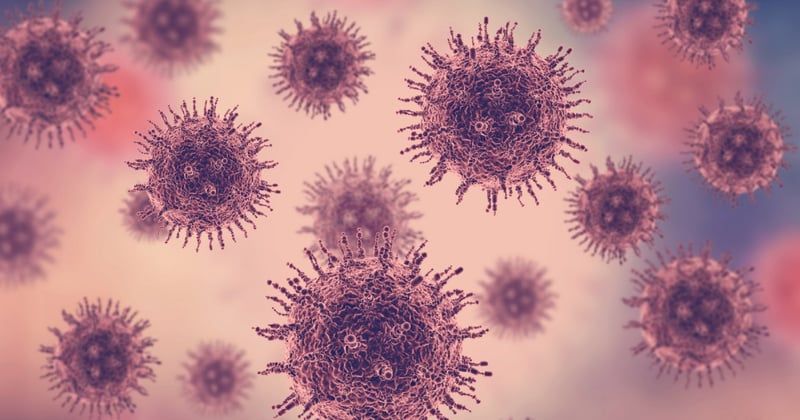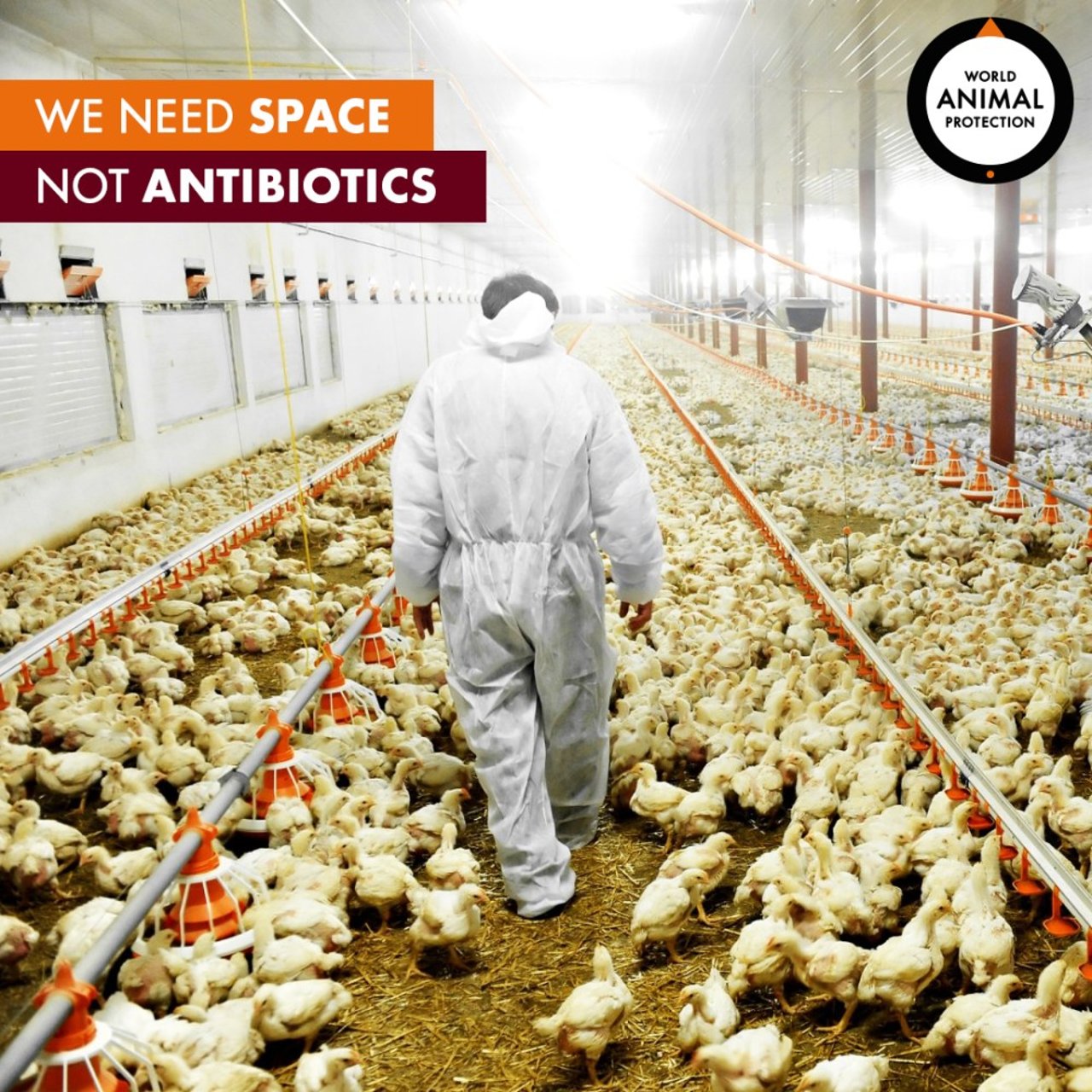
Zoonoses is a disease that can easily be transferred from animals to humans. World Animal Protection 2020 survey across 15 countries found that 92% of people in India are concerned about superbugs from farm animals and want animals treated well and antibiotics used responsibly.
COVID-19 - a tragedy for the whole world
Covid-19 has already proven a tragedy for the whole world, and yet, we are feeding recipes for another pandemic- Antimicrobial Resistance (AMR)/Superbugs. Superbugs have developed resistance to one or more antibiotics, rendering those antibiotics less effective in treating infections.
Superbugs kill 700,000 people per year. Deaths could amount to 10 million people per year by 2050, costing 100 trillion USD annually[i]. In addition, there is a crossover between antibiotics used to treat humans and those used in farming. When farm animals are administered antibiotics for humans, superbugs can arise and directly infect humans or cross-resistance (with other bacteria). This renders antibiotics ineffective in treating human diseases.
Overuse of antibiotics is harmful
Whilst over-use of human medicine is a key driver of the development of superbugs, the routine overuse of antibiotics in animal agriculture is recognised by the World Health Organisation and the UN as a significant contributor to the emergence of superbugs, causing drug-resistant food poisoning, blood poisoning and urinary tract infections that be fatal30.
Intensive farming causes suffering to billions of farm animals and compromises our health and the environment. The system depends on the overuse of antibiotics to keep stressed animals from getting sick in dismal conditions. Keeping genetically uniform animals squashed together, subjected to painful mutilations, and unable to express their natural behaviours is a risk factor for the emergence of superbugs from antibiotic overuse and pandemics. Diseases such as swine flu, bird flu and Nipah virus all emerged from farmed animals.
Superbugs make antibiotics less effective in treating medical conditions. World Animal Protection 2020 survey across 15 countries found that 92% of people in India are concerned about superbugs from farm animals and want animals treated well and antibiotics used responsibly.
How superbugs are reaching human beings?
Superbugs and antibiotic-resistant genes do not just remain on the farm. Intensive animal production generates large quantities of animal waste, often spread on land for use as a fertiliser or discharged into public waterways. Once in the environment, superbugs can reach humans in multiple ways. This ranges from recreation, water used for drinking and washing, consumption of fish and bivalves from contaminated water, and crop production-consumption contaminated with surface water. Also, animals do not metabolise around 70% of the antibiotics administered to them, so that antibiotics can transfer into animal waste. As a result, bacteria can survive in untreated farm animal waste for 2–12 months[ii].
Whilst there have been studies measuring antibiotic residues in waterways in different parts of the world, World Animal Protection has conducted the first multi-country investigation of antibiotic resistance genes downstream of factory farms.
The testing took place in 4 countries across 3 continents: Canada, Spain, Thailand and the USA. It found powerful antibiotic resistance genes downstream from factory farms. However, contaminated samples were also found upstream in areas with a high density of pig farms. This suggests factory/intensive farms could be discharging resistant genes and superbugs into the wider environment due to pig waste being discharged directly into waterways or spread on fields and then leeching into public waterways. Genes conveying resistance to WHO categorised Highest priority Critically Important Antibiotics such as fluoroquinolones, macrolides, and third-generation cephalosporins were found in our study in public water contaminated from pig farm wastewater. These antibiotics are used to treat serious human infections, including some in the treatment of secondary bacterial infection to covid-19[iii].
A study conducted by the Center for Science and Environment
In 2018, a multi-institutional study conducted by the Center for Science and Environment, India, found a pan drug-resistant E.coli isolated from a heavily polluted stretch of river Yamuna in Delhi, which was resistant to 20 of the 21 antibiotics tested. In the same year, researchers from the Indian Institute of Technology (IIT) Delhi found high carbapenem-resistant bacteria in wastewater effluent from hospitals, sewage treatment plants, drains, and other locations from the Yamuna River in Delhi. [iv]
As mentioned in National Action Plan on AMR, India, the consumption of antimicrobials in the food animals sector in India is expected to double by 2030. Given that there are few regulations against the use of antibiotics for non-therapeutic purposes in India, the emergence of AMR from antibiotic overuse in the animal sector is likely to be an unmeasured burden in India and hence reducing antibiotic use in the farming industry is the key approach which can be well adopted by implementing High Welfare Farming Systems. In countries where antibiotic use is restricted, then levels of antimicrobial-resistant bacteria reduce. This has been seen in Denmark, Sweden, Netherlands and the UK in the pig industries. Reduction in antibiotic use can be achieved by improving animal welfare. In Finland, Sweden, Denmark, Netherlands and Thailand, ending tail cutting of piglets has reduced antibiotic use[v],[vi]. In addition, the use of high welfare chicken breeds that grow more slowly allows for substantial reductions in antibiotic use compared with conventional intensive systems [vii] [viii].
Even though the World Health Organisation recommends that antibiotics should not be routinely used to prevent disease across groups of farm animals[ix], it remains legal and widespread in many countries. Overall, monitoring of the use of antibiotics on farms is in its infancy. World Animal Protection India believes that antibiotics should be reserved to treat animals, not used to promote fast growth or as band-aids across the herd to prevent stressed animals from getting sick. A humane and sustainable food system would involve producing and consuming far fewer farm animals, with a small number raised in conditions where they can live good lives and a predominantly plant-based diet.
Outcomes of the study in different parts of the world
In Spain, our groundwater testing near industrial pig farms revealed very high levels of antibiotic resistance genes; groundwater was used for human water supplies in some regions in the past. This study also revealed river water downstream to other farms contained antibiotic resistance genes up to 200 times the baseline levels. Dust samples, taken near farms, also contained very high key genes conveying resistance to third-generation cephalosporins and tetracyclines.
Testing in Thailand found superbugs resistant to third-generation cephalosporins, fluoroquinolones, colistin, co-trimoxazole, gentamicin, amikacin, and trimethoprim-sulfamethoxazole or amoxicillin. This is the first finding of antibiotic resistance genes from pig farms in Central Thailand. However, similar antibiotic resistance genes have been found near pig farms in other regions in Thailand in recent years.
Our research in Canada documents what we believe to be the first finding of antibiotic resistance genes in Manitoba that convey resistance to cephalosporins, fluoroquinolones, macrolides, and tetracycline. The results reflect similar findings from other provinces. Overuse of antibiotics is systemic in the pig industry. As a result, there is significant spillover, particularly of tetracycline, to the public lake and river freshwater beaches, conservation areas, and wildlife.
Our researchers found widespread evidence of antibiotic resistance genes conveying resistance to tetracycline and streptomycin in the USA. But, most importantly, they also found antibiotic resistance genes conveying resistance to macrolides, cephalosporins, fluoroquinolone and possibly carbapenem antibiotics.
Sources:
[i] FAO Action plan on antimicrobial resistance 2016-2020, http://www.fao.org/3/a-i5996e.pdf
[ii] Sobsey, M.D., L.A. Khatib, V.R. Hill, E. Alocilja, and S. Pillai. 2001. Pathogens in animal wastes and the impacts of waste management practices on their survival, transport and fate. White Paper Summaries. Available online http://www.cals.ncsu.edu/waste_mgt/natlcenter/whitepapersummaries/ pathogens.pdf (verified 16 Feb. 2009)
[iii] Clancy, CJ, Buehrle, DJ, Nguyen, MH, PRO: The COVID-19 pandemic will result in increased antimicrobial resistance rates, JAC-Antimicrobial Resistance, Volume 2, Issue 3, September 2020, dlaa049, https://academic.oup.com/jacamr/article/2/3/dlaa049/5872561
[v] Stygar A.; Chantziaras I.; Toppari I.; Maes D.; Niemi J. High biosecurity and welfare standards in fattening pig farms are associated with reduced antimicrobial use. Animal. 2020 Apr;1-9. doi:10.1017/S1751731120000828
[vi] World Animal Protection. Sharing success – the global business case for higher welfare for pigs raised for meat. 2019. Available from: https://www.worldanimalprotection.org/sites/default/files/media/int_fil…
[vii] Wageningen University and Research. Economics of antibiotic usage on Dutch farms. Wageningen Economic Research. 2019. Available from: https://edepot.wur.nl/475403
[viii] AVINED. Antibioticumgebruik Pluimveesector in 2019 en de Trends van Afgelopen Jaren.AVINED 2020. Available from: https://www.avined.nl/sites/avined/files/2020-091-e0023-jaarrapport.pdf
[ix] World Health Organisation. WHO guidelines on use of medically important antimicrobials in food-producing animals. 2017. https://apps.World Health Organisation.int/iris/bitstream/handle/10665/258970/9789241550130-eng.pdf?sequence=1
Intensive farming causes suffering to billions of farm animals and compromises our health and the environment.
